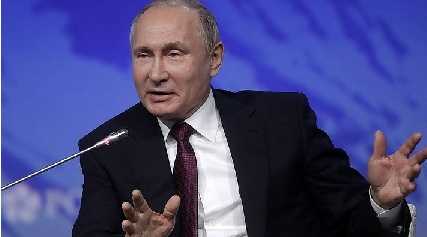
June 16 (Reuters) - President Vladimir Putin said on Friday that his deployment of tactical nuclear weapons to Belarus, something he confirmed for the first time had already happened, was a reminder to the West that it could not inflict a strategic defeat on Russia.
Speaking at Russia's flagship economic forum in St Petersburg, Putin said Russian tactical nuclear warheads had already been delivered to close ally Belarus, but stressed he saw no need for Russia to resort to nuclear weapons for now.
"As you know we were negotiating with our ally, (Belarusian President (Alexander) Lukashenko, that we would move a part of these tactical nuclear weapons to the territory of Belarus - this has happened," said Putin.
"The first nuclear warheads were delivered to the territory of Belarus. But only the first ones, the first part. But we will do this job completely by the end of the summer or by the end of the year."
The move, Moscow's first deployment of such warheads - shorter-range nuclear weapons that could potentially be used on the battlefield - outside Russia since the fall of the Soviet Union was intended as a warning to the West about arming and supporting Ukraine, the Russian leader said.
"...It is precisely as an element of deterrence so that all those who are thinking about inflicting a strategic defeat on us are not oblivious to this circumstance," said Putin, using a diplomatic term for a defeat so severe that Russian power would be diminished on the world stage for decades.
Lukashenko, a staunch ally of Putin, said late on Tuesday his country had started taking delivery of Russian tactical nuclear weapons that included some three times more powerful than the atomic bombs the U.S. dropped on Japan in 1945.
The Russian leader announced in March he had agreed to deploy tactical nuclear weapons in Belarus, pointing to the U.S deployment of such weapons in a host of European countries over many decades.
PUTIN SAYS WEST WANTS STRATEGIC DEFEAT
The United States has criticised Putin's decision but has said it has no intention of altering its own stance on strategic nuclear weapons and has not seen any signs that Russia is preparing to use a nuclear weapon.
The Russian step is nonetheless being watched closely by Washington and its allies as well as by China, which has repeatedly cautioned against the use of nuclear weapons in the war in Ukraine.
Putin said the West was doing everything it could to inflict a strategic defeat on Russia in Ukraine where Moscow is locked in the biggest land war in Europe since World War Two after invading its neighbour last year in what it called "a special military operation."
But Russia had no need to resort to nuclear weapons for now, said Putin, signalling no change in Moscow's nuclear posture which only envisages such a move if the existence of the Russian state is threatened.
"Nuclear weapons have been made to ensure our security in the broadest sense of the word and the existence of the Russian state, but we...have no such need (to use them)," Putin said.
But he said talks with the West to reduce Russia's vast nuclear arsenal, the world's largest, were a non-starter.
"Just talking about this (the potential use of nuclear weapons) lowers the nuclear threshold. We have more than NATO countries and they want to reduce our numbers. Screw them," said Putin.
Sounding defiant as he addressed his country's political and business elite, he said a Ukrainian counteroffensive against Russian forces in Ukraine had so far not had any meaningful success. Kyiv's forces were suffering heavy losses and had "no chance" against Russia's military, he said.
Ukraine would soon run out of its own military equipment, making it totally reliant on hardware supplied by the West, undermining its ability to fight for long, he suggested.
Recalling his stated objectives at the start of the war to "demilitarise" and "denazify" Ukraine, Putin said:
"As for demilitarisation, soon Ukraine will stop using its own equipment altogether. There's nothing left. Everything on which they fight and everything that they use is brought in from the outside. Well, you can't fight like that for long."
PUTIN GIVES WARNING ON F-16S
Independent military analysts say Ukraine has outperformed Russia's much larger army in nearly 16 months of war, forcing it into major retreats around the cities of Kyiv, Kharkiv and Kherson.
Ukraine's military chiefs said on Friday that advancing Ukrainian troops were facing "desperate resistance" from Russian forces around the city of Bakhmut, which Russia captured last month after the longest battle of the war.
Ukraine says it has recaptured seven villages and 100 square km (38 square miles) in the early stages of its counteroffensive.
But Russia's Defence Ministry said on Friday its forces had repelled numerous attempted counterattacks by the Ukrainian army at different frontline locations in the last 24 hours, inflicting severe losses on Kyiv's forces.
Putin said Western-supplied hardware such as German-made Leopard tanks was regularly destroyed and if Kyiv got U.S.-made F-16 fighter jets from its allies, they would go up in flames too.
"F-16s will also be burning, there is no doubt. But if they will be stationed outside Ukraine and used in combat operations we will have to look at how to engage and where to engage those assets being used in combat operations against us."
That, he said, represented "a serious danger" of dragging NATO further into the conflict.




